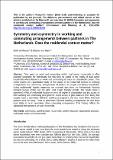Files in this item
Symmetry and asymmetry in working and commuting arrangements between partners in the Netherlands : does the residential context matter?
Item metadata
| dc.contributor.author | de Meester, Edith | |
| dc.contributor.author | Van Ham, Maarten | |
| dc.date.accessioned | 2016-01-06T16:10:07Z | |
| dc.date.available | 2016-01-06T16:10:07Z | |
| dc.date.issued | 2009-09 | |
| dc.identifier | 2109279 | |
| dc.identifier | dffaca32-0cc9-4675-a262-2b86bd12504b | |
| dc.identifier | 000270524700010 | |
| dc.identifier | 70350542863 | |
| dc.identifier.citation | de Meester , E & Van Ham , M 2009 , ' Symmetry and asymmetry in working and commuting arrangements between partners in the Netherlands : does the residential context matter? ' , Environment and Planning A , vol. 41 , no. 9 , pp. 2181-2200 . https://doi.org/10.1068/a41246 | en |
| dc.identifier.issn | 0308-518X | |
| dc.identifier.other | ORCID: /0000-0002-2106-0702/work/64697584 | |
| dc.identifier.uri | https://hdl.handle.net/10023/7982 | |
| dc.description.abstract | Time spent on work and commuting within dual-earner households is often analysed separately for individuals, but this does no justice to the reality of dual-earner households where decisions on work and commuting are made in a household context. This paper reports on a quantitative study of the impact of the residential context on working arrangements and commuting arrangements of partners in couple and family households. Using multinomial logistic regression, we analysed data from the 2002 Netherlands Housing Demand Survey and the 2004 ABF Real Estate Monitor. The results show a (gendered) effect of residential location in terms of degree of urbanisation and job access on both working and commuting arrangements. Good access to jobs makes it more likely that couples have a symmetric full-time working arrangement and also more likely that both partners work far away from home. Those in symmetric full-time working arrangements are also those most likely to be in symmetric close | |
| dc.format.extent | 20 | |
| dc.format.extent | 412312 | |
| dc.language.iso | eng | |
| dc.relation.ispartof | Environment and Planning A | en |
| dc.subject | Travel-time | en |
| dc.subject | Paid work | en |
| dc.subject | Household | en |
| dc.subject | Home | en |
| dc.subject | Women | en |
| dc.subject | Strategies | en |
| dc.subject | Children | en |
| dc.subject | Balance | en |
| dc.subject | Couples | en |
| dc.subject | Urban | en |
| dc.subject | H Social Sciences (General) | en |
| dc.subject.lcc | H1 | en |
| dc.title | Symmetry and asymmetry in working and commuting arrangements between partners in the Netherlands : does the residential context matter? | en |
| dc.type | Journal article | en |
| dc.contributor.institution | University of St Andrews. Geography & Sustainable Development | en |
| dc.contributor.institution | University of St Andrews. School of Geography and Geosciences | en |
| dc.identifier.doi | https://doi.org/10.1068/a41246 | |
| dc.description.status | Peer reviewed | en |
This item appears in the following Collection(s)
Items in the St Andrews Research Repository are protected by copyright, with all rights reserved, unless otherwise indicated.

